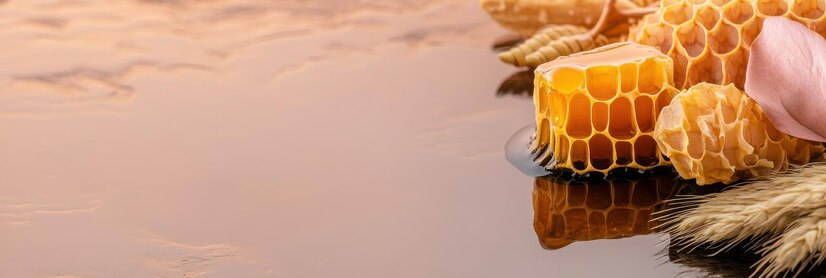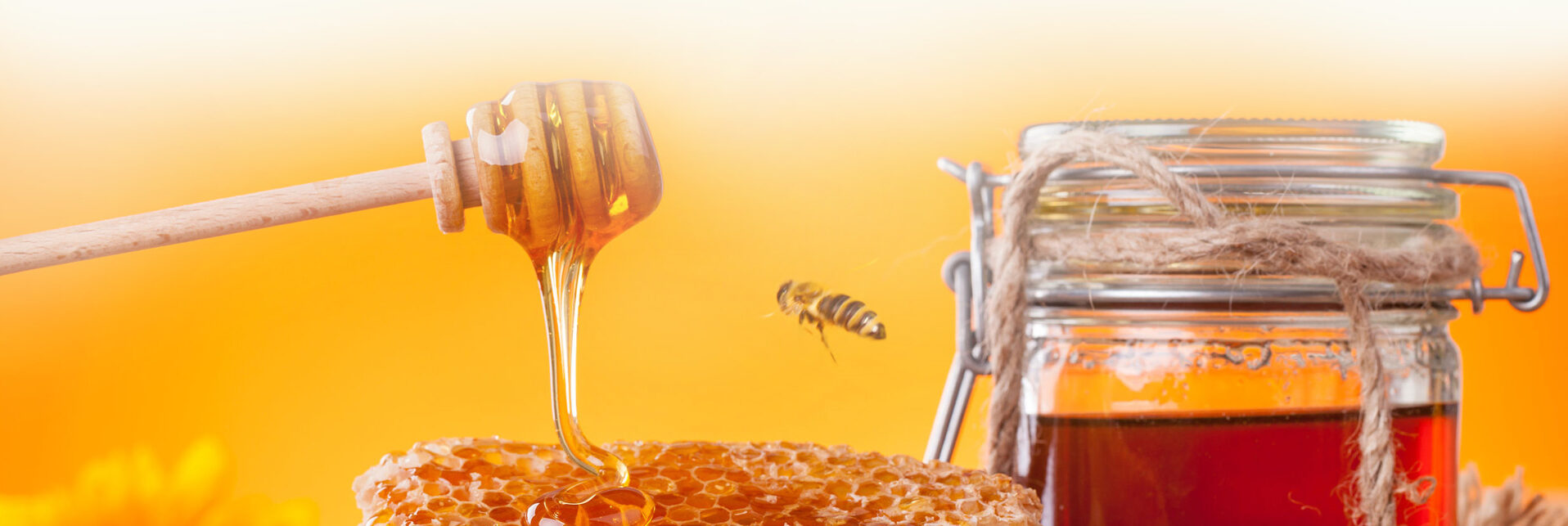Email: info@7organica.com / Phone: 9953199609
FREE Shipping All OVER INDIA



No products in the cart.
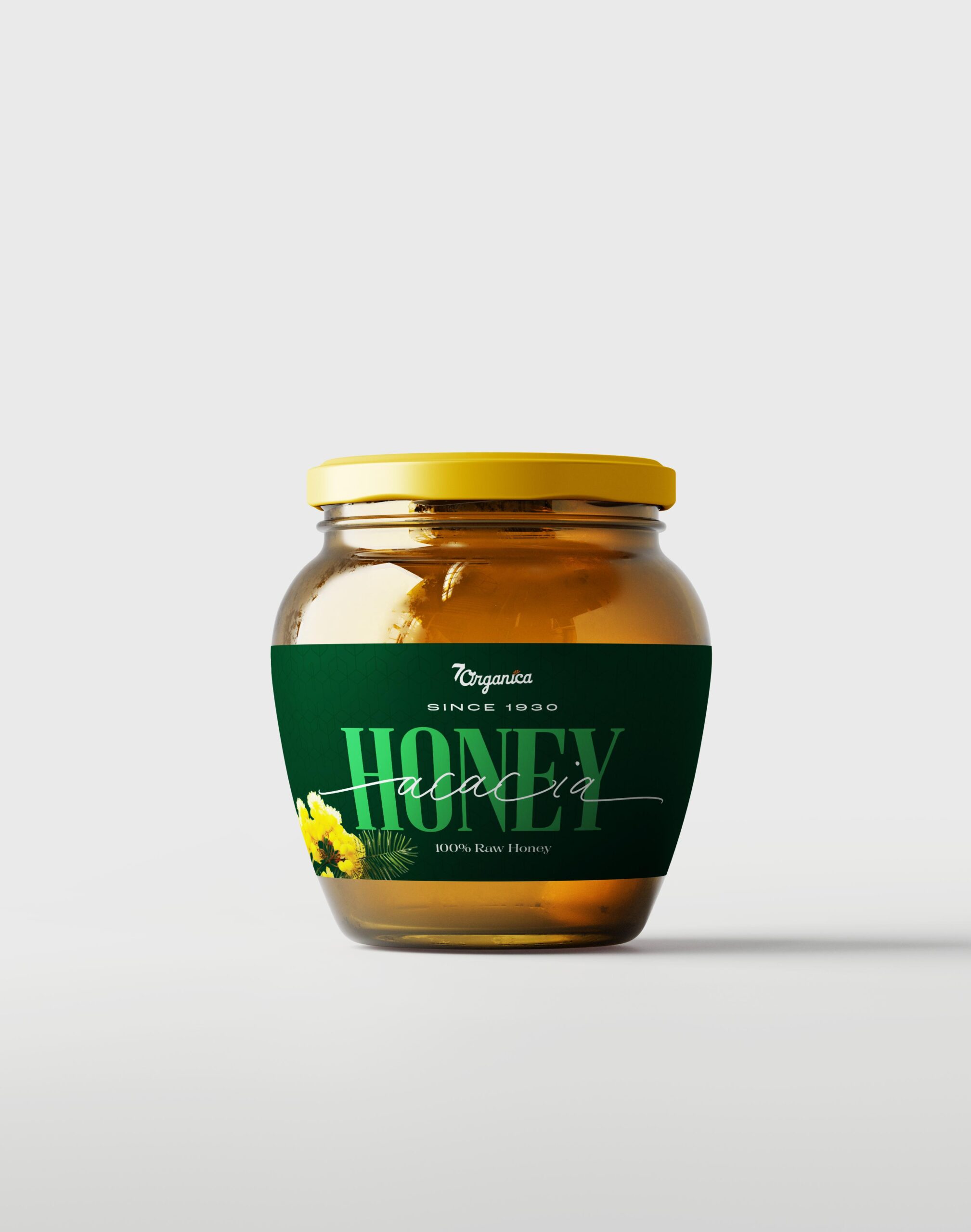
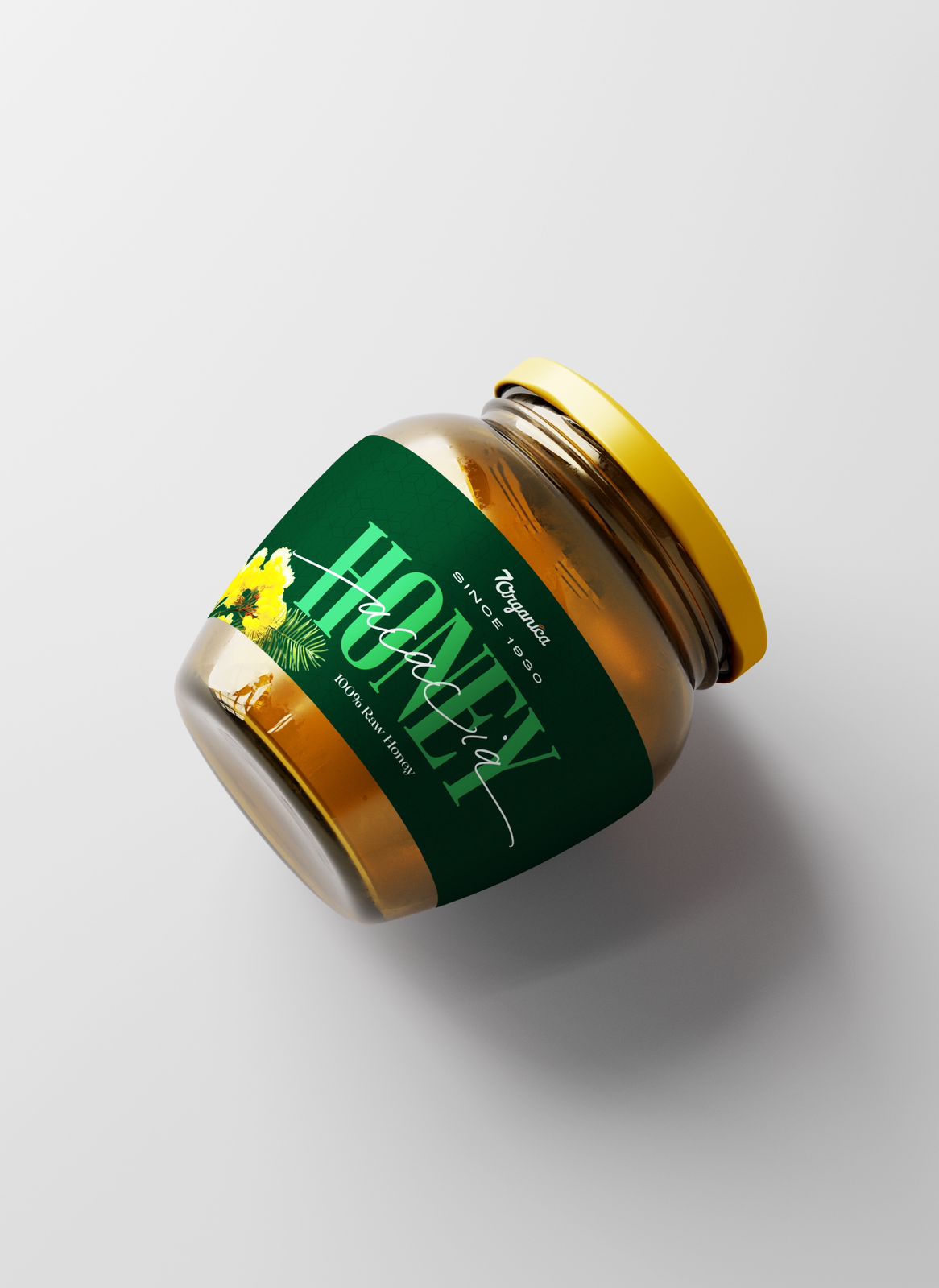
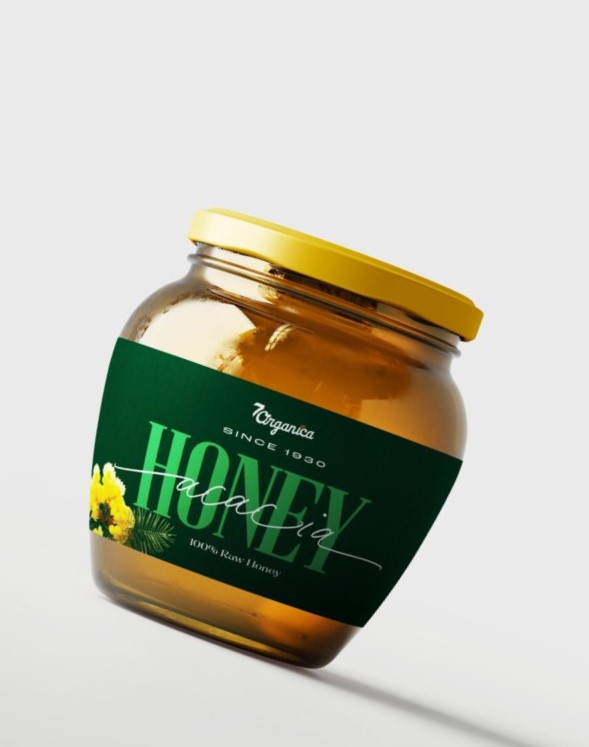

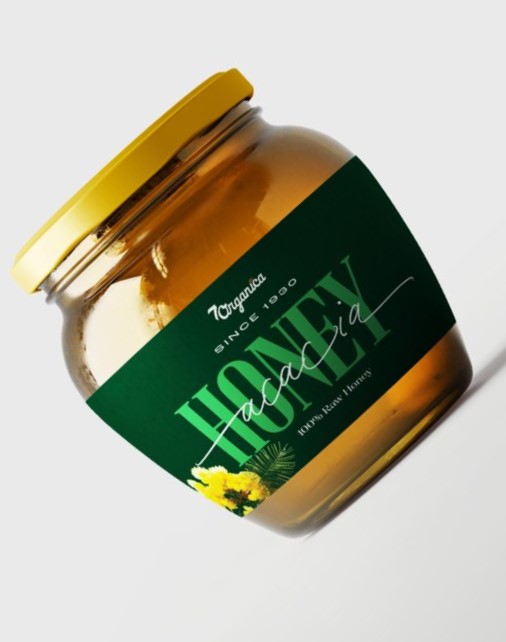
Acacia Honey
Acacia honey is a light, mild honey produced primarily from the nectar of the blossoms of the black locust tree (Robinia pseudoacacia).
₹35,000
Cash on Delivery
Free Shipping
Express Delivery
Easy Return
- Light Color and Clarity
- Mild and Floral Flavor
- Smooth, Runny Texture
- High Fructose Content
- Health Benefits
Description
Acacia honey is a premium variety known for its light color, typically ranging from clear to pale yellow, and its glossy appearance with minimal sediment. This honey is celebrated for its mild and delicate flavor, characterized by subtle floral notes that make it an excellent sweetener for beverages and dishes without overwhelming their natural flavors.
Its smooth, runny texture, coupled with a low tendency to crystallize, allows it to remain pourable for a long time, enhancing its convenience in the kitchen. With a high fructose content, acacia honey not only stands out for its sweetness but also contributes to its unique properties, making it less likely to crystallize compared to other honey types.
Additionally, acacia honey is rich in antioxidants and offers soothing benefits for throat health, making it a popular choice for both culinary uses and health-conscious consumers.
Benefits
Rich in Antioxidants: Acacia honey contains natural antioxidants that help combat oxidative stress in the body, potentially reducing the risk of chronic diseases.
Soothes Sore Throats: Its natural antimicrobial properties make acacia honey effective in soothing sore throats and alleviating coughs, providing relief from respiratory discomfort.
Natural Sweetener: With a lower glycemic index compared to refined sugars, acacia honey serves as a healthier alternative for sweetening beverages and foods, making it suitable for those managing blood sugar levels.
Promotes Digestive Health: The prebiotic properties of acacia honey may aid in promoting gut health by supporting beneficial gut bacteria, improving overall digestion.
Skin Benefits: Acacia honey can be used topically for its moisturizing and soothing properties, making it beneficial for various skin conditions, such as dryness and irritation.
Clinical Results
Antioxidant Activity: Studies have shown that acacia honey exhibits significant antioxidant properties, which can help reduce oxidative stress and may lower the risk of certain diseases.
Antimicrobial Effects: Research has demonstrated that acacia honey possesses antimicrobial properties, making it effective against certain pathogens, which supports its traditional use for soothing sore throats and coughs.
Wound Healing: Some clinical studies have indicated that honey, including acacia honey, can promote wound healing due to its antibacterial properties and ability to maintain a moist wound environment.
Glycemic Control: Clinical observations suggest that honey, particularly acacia honey, may have a lower glycemic index compared to regular sugars, indicating it might have a lesser impact on blood sugar levels when consumed in moderation.
Digestive Health: Some studies have pointed to honey’s prebiotic effects, suggesting that acacia honey can support gut health by promoting the growth of beneficial gut bacteria, which may improve digestion.
Verified Customer Reviews

⭐⭐⭐⭐⭐
"Overall, acacia honey is a delightful and beneficial product that appeals to a wide range of consumers. Its mild flavor, smooth texture, and health benefits make it a favorite among honey lovers and health-conscious individuals alike. Whether you're looking to enhance your culinary creations or enjoy its health perks, acacia honey is a worthwhile addition to any pantry."
Admin
Ingredients
1. What is Acacia Honey?
Acacia honey is a type of honey produced primarily from the nectar of the black locust tree (Robinia pseudoacacia). It is known for its light color, mild flavor, and low crystallization rate.
2. What are the health benefits of Acacia Honey?
Acacia honey is rich in antioxidants, has antimicrobial properties, may help soothe sore throats, supports digestive health, and serves as a natural sweetener with a lower glycemic index compared to refined sugars.
3. How should Acacia Honey be stored?
To preserve its flavor and quality, acacia honey should be stored in a cool, dry place, away from direct sunlight. It can be kept in a glass or plastic container with a tight seal.
4. Is Acacia Honey safe for everyone?
While acacia honey is generally safe for most people, it should not be given to infants under one year of age due to the risk of botulism. Individuals with allergies to bee products should consult a healthcare provider before consumption.
5. How can I use Acacia Honey in cooking?
Acacia honey can be used as a natural sweetener in tea, coffee, smoothies, and baked goods. It can also be incorporated into marinades, dressings, and glazes for a touch of sweetness.
6. Why does Acacia Honey not crystallize?
Acacia honey has a high fructose content and low glucose levels, which makes it less likely to crystallize compared to other types of honey. This property allows it to remain in a liquid state for a longer time.
7. How can I tell if my Acacia Honey is pure?
To ensure purity, check for labels indicating “100% pure acacia honey” with no added ingredients. You can also perform simple tests at home, such as dissolving a small amount in water; pure honey should not leave residue.
8. Can Acacia Honey help with allergies?
Some people believe that consuming local honey may help with seasonal allergies by gradually exposing the body to local pollen. However, more research is needed to support this claim, and it may not work for everyone.
9. What is the difference between Acacia Honey and regular honey?
The primary differences lie in flavor, color, and crystallization properties. Acacia honey is lighter, has a more delicate floral flavor, and tends to remain liquid longer compared to many other types of honey.
10. Can I use Acacia Honey for skincare?
Yes, acacia honey can be used topically for its moisturizing and soothing properties. It may help with skin hydration and can be applied to minor cuts or irritations, but it’s best to perform a patch test first.
FAQ
1. What is Acacia Honey?
Acacia honey is a type of honey produced primarily from the nectar of the black locust tree (Robinia pseudoacacia). It is known for its light color, mild flavor, and low crystallization rate.
2. What are the health benefits of Acacia Honey?
Acacia honey is rich in antioxidants, has antimicrobial properties, may help soothe sore throats, supports digestive health, and serves as a natural sweetener with a lower glycemic index compared to refined sugars.
3. How should Acacia Honey be stored?
To preserve its flavor and quality, acacia honey should be stored in a cool, dry place, away from direct sunlight. It can be kept in a glass or plastic container with a tight seal.
4. Is Acacia Honey safe for everyone?
While acacia honey is generally safe for most people, it should not be given to infants under one year of age due to the risk of botulism. Individuals with allergies to bee products should consult a healthcare provider before consumption.
5. How can I use Acacia Honey in cooking?
Acacia honey can be used as a natural sweetener in tea, coffee, smoothies, and baked goods. It can also be incorporated into marinades, dressings, and glazes for a touch of sweetness.
6. Why does Acacia Honey not crystallize?
Acacia honey has a high fructose content and low glucose levels, which makes it less likely to crystallize compared to other types of honey. This property allows it to remain in a liquid state for a longer time.
7. How can I tell if my Acacia Honey is pure?
To ensure purity, check for labels indicating “100% pure acacia honey” with no added ingredients. You can also perform simple tests at home, such as dissolving a small amount in water; pure honey should not leave residue.
8. Can Acacia Honey help with allergies?
Some people believe that consuming local honey may help with seasonal allergies by gradually exposing the body to local pollen. However, more research is needed to support this claim, and it may not work for everyone.
9. What is the difference between Acacia Honey and regular honey?
The primary differences lie in flavor, color, and crystallization properties. Acacia honey is lighter, has a more delicate floral flavor, and tends to remain liquid longer compared to many other types of honey.
10. Can I use Acacia Honey for skincare?
Yes, acacia honey can be used topically for its moisturizing and soothing properties. It may help with skin hydration and can be applied to minor cuts or irritations, but it’s best to perform a patch test first.
Acacia honey can be used in a variety of delightful ways. As a natural sweetener, it enhances beverages like tea, coffee, smoothies, and lemonade with its mild flavor that complements rather than overpowers.
In baking, it serves as a perfect substitute for granulated sugar; typically, you can use about ¾ cup of honey for every cup of sugar while reducing the liquid ingredients slightly.
Acacia honey can be used throughout the day in various situations, making it a versatile addition to your diet. In the morning, start your day with a spoonful in your tea, coffee, or smoothie for a natural energy boost.
During breakfast, drizzle it over pancakes, waffles, or oatmeal, or enjoy it with yogurt and fruit for a nutritious start. When cooking or baking, acacia honey enhances flavors in marinades, salad dressings, and glazes for roasted vegetables.
To properly store acacia honey and maintain its quality, use a clean, airtight container, preferably a glass jar, as it does not react with honey. Keep the container in a cool, dark place, such as a pantry or cupboard, away from direct sunlight and heat sources, as extreme temperatures can affect its texture and flavor.
Always use a clean, dry utensil when scooping out honey to avoid contamination; never dip food or wet utensils directly into the jar.
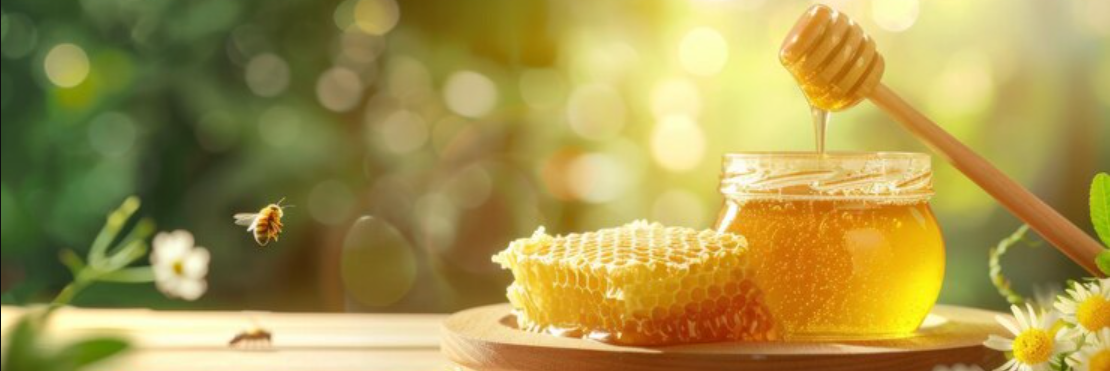
Key Ingredients
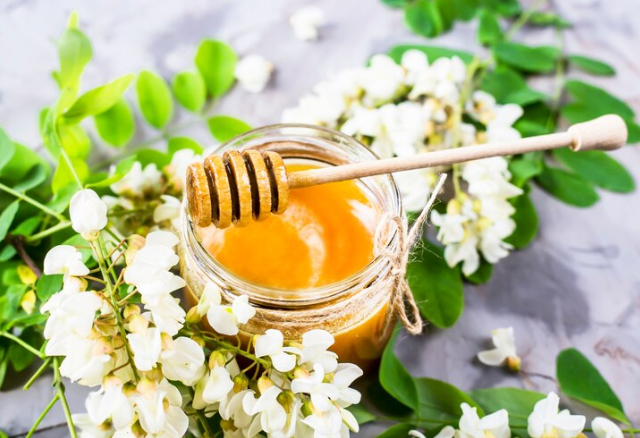
Acacia Flower Nectar
Acacia honey is primarily derived from the nectar of the flowers of the black locust tree (Robinia pseudoacacia), also known as the false acacia. This flower produces a light, fragrant nectar that bees collect to create the honey. The nectar is rich in natural sugars, mainly fructose and glucose, which contribute to acacia honey's mild sweetness and unique floral flavor. Additionally, the nectar is known for its high antioxidant content, making it beneficial for health. The light color and clarity of acacia honey are also characteristic of the nectar collected from these delicate blooms.

Natural Enzymes
Another key ingredient in acacia honey is the natural enzymes that bees add during the honey-making process. These enzymes, such as invertase and diastase, play a crucial role in breaking down the sugars in the nectar, converting sucrose into simpler sugars like fructose and glucose. This enzymatic activity not only contributes to the honey's sweetness but also enhances its preservative qualities and nutritional benefits. The presence of these enzymes makes acacia honey easier to digest and gives it its smooth, runny texture, allowing it to retain its liquid form longer than many other honey varieties.
Complete Your Routine
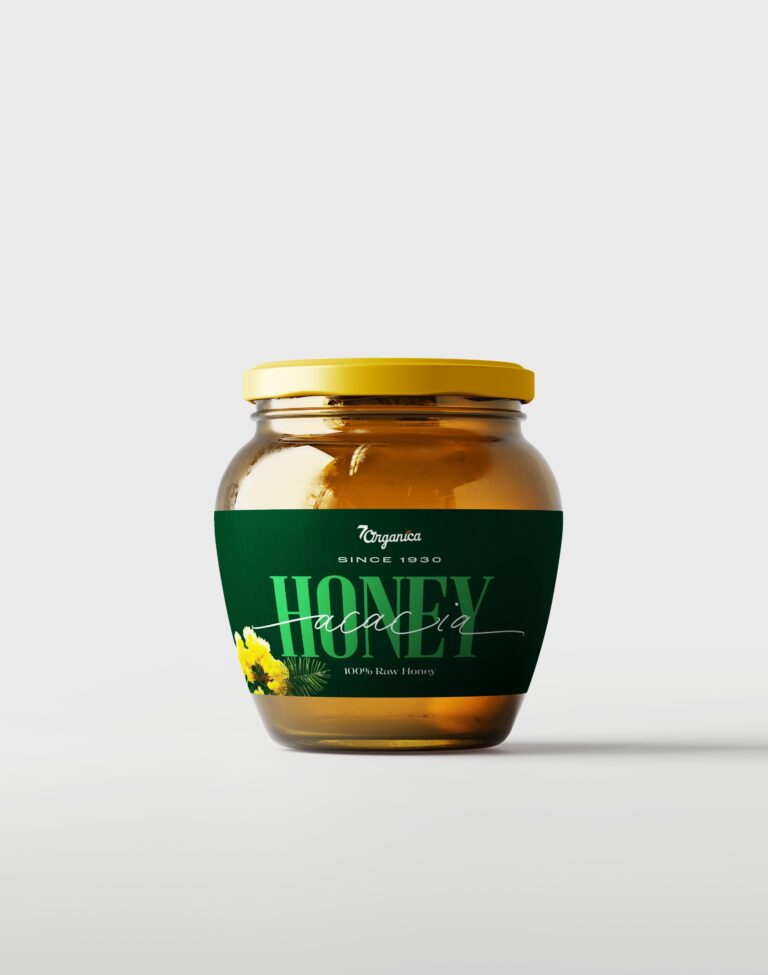
Acacia honey is a light, pale amber honey derived from the nectar of the blossoms

Eucalyptus Honey is a rich, amber honey with a unique, mildly herbal flavor and subtle hints of eucalyptus.
Self-Care Simplified
CLEAN
vegan
CRUELTY FREE
CLINICALLY TESTED
Certifications




